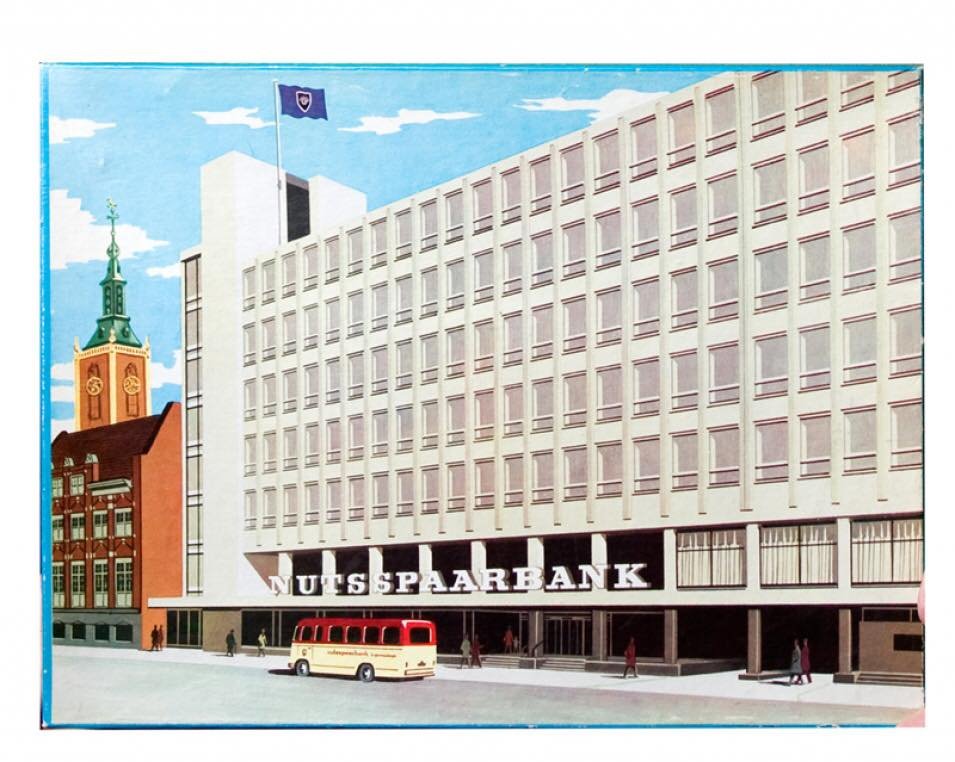
Mobile Service: the bank goes to the people
For over fifty years, the Hague Nutsspaarbank went to the people. First with travelling sub-branches, and later with Mobile Service.



In 1954, the board decided that the bank needed mobile sub-branches. The service was intended for clients who couldn’t get to a branch, including people living in new housing estates. The buses also visited a number of retirement homes. However, they still tried to identify suitable locations for new branches.
From 1955 onwards, the travelling branches of the Nutsspaarbank were part of the scenery in The Hague. After Amsterdam, The Hague was the next city to deploy these Volkswagen buses. The mobile branches initially set up shop at seven different locations. The concept was a hit, and so two more buses were sent out to offer services at several new locations.
Pioneers
‘Pioneering work’, is how Mr Zembsch, head of branch services, referred to the work of the ‘bus crews’. Thanks to them, the bank was able to expand the number of permanent branches considerably. “Take Theresiastraat, for example. We already had a branch in the shopping area, but the busy road formed an obstacle to a lot of people. We posted a bus on the other side of Laan van N.O.I. and this turned out to be the perfect spot for a second branch. The bus operating in Zoetermeer is testing which locations are the busiest’’, Zembsch reported in 1978 in the October edition of the Seinpost staff magazine.
The pioneering work of the bus crews helped to expand the number of permanent branches.
Mobile Service
Henk Hoogweg was one of the drivers of the travelling sub-branch buses. “The buses were quite big, always manned by two people. And the drivers were always men. They didn’t have power-steering so they were quite heavy to manoeuvre. In 1969, the mobile travelling sub-branches made way for the Mobile Service.”
The Mobile Service drove around in smaller buses. First of all Volkswagens, then later Peugeots. “The Mobile Service didn’t go to housing estates, but they did visit retirement homes; 64 in total”, explains former MBS manager Meta Waaijer. “We could do everything that we did in a normal sub-branch, but we didn’t provide mortgages or loans. It was mainly for payments. The Mobile Service had an important social element function too”, adds former employee Yolanda van Mil.
Jokes
The Mobile Service went to two retirement homes per day, from Monday to Friday. “We worked during school hours. First we had to count the money. You got a float of 20,000 guilders, for example, and you had to count it yourself. We did that at head office”, Henk explains. “We had to be at the location by 9 a.m. We went back for lunch at around 11.30, and at 1 p.m. we left for the next location”, says former-employee Connie Westdorp. The money was counted again by one colleague at the end of the day, while the driver parked the bus. “Wednesday was fish day. Someone always went into Scheveningen to buy fish for everyone”, Yolanda remembers. “But the Zoetermeer bus stayed in Zoetermeer at lunchtime”, according to former employee Rob Westdorp.
The atmosphere on the buses was always relaxed, and the employees were happy to joke with each other. “There weren’t any toilets on the bus, of course”, says Henk. “So one day, one of the male colleagues needed a pee. So we said: ‘Go behind the bus, no-one will see you.’ So he goes behind the bus and what did we do? Hit the gas pedal of course!” Henk laughs. He also admits that the buses sometimes competed with each other to be first back at head office. The staff working on the buses didn’t have to wear suits. “We didn’t wear ties either, just a shirt”, says Rob. That all changed when Meta took over. “My first thought was: ‘What on earth is this?’ I said straight away that I didn’t expect to see any more shorts, jeans, short skirts, and or T-shirts.” Rob laughs: “Not that we took much notice when it was hot.”
Psychiatric patients
As well serving retirement homes, the bus also visited the Endegeest psychiatric hospital. “We stayed there all day”, Yolanda remembers. It was a social occasion for the patients. “The atmosphere was always friendly”, says Connie. “You had Arie, for instance, who always sang you a song. He came to pick up his spending money and we’d say: ‘We need a song first, Arie.’” They were never afraid of the patients. “If one of them felt like jumping over the counter, there was always someone from the hospital to stop them”, says Yolanda dryly.
The Nutsspaarbank always believed in the social aspect of its travelling sub-branches. But all this changed after the merger with the VSB Bank. “The Mobile Service stopped in 1996”, says Rob. “I think we were already Fortis by then.” Henk retired. Rob and Yolanda moved to the branch in Utrecht. Meta and Connie left the bank too. But they never really lost the ‘Nuts feeling’. “We’re still very relaxed. Anything goes. Hearing us now, it’s like we come from another planet, isn’t it?”